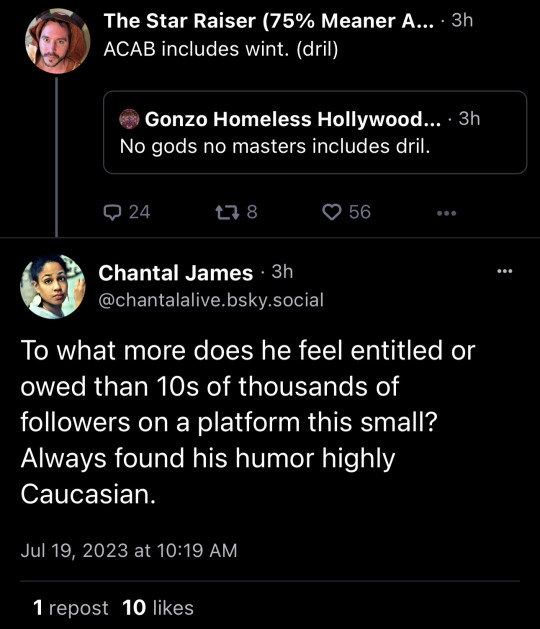#Silicon Web Site
Explore tagged Tumblr posts
Text
I'm seeing a bunch of artists on here who don't realize there's an alt text feature and it's bugging me.
I'm wondering if maybe it would be better web design to re-use the ALT prompt we see in pictures with alt-text added as the prompt to add an image description in the post editor, instead of hiding it behind a meatball menu for no reason.
#it makes the posts really long - which is necessary IF you are adding a description to someone else's image#but if it's an image you yourself added there's a place where the description goes#and I think this site's web designers have failed to thoroughly demonstrate its existence.#tumblr#social media#the scourge of modern web design is tucked-away features that nobody uses because NOBODY KNOWS THEY ARE THERE COME ON SILICON VALLEY
0 notes
Text
========================================================
[tutorial: build your own neocities/nekoweb page]
========================================================
a beginner's guide for making your very own home on the indie web—retro, personal, weird, and 100% yours.
this ain’t an average wix, squarespace, or tiktok aesthetic.
we’re talking full html/css with soul and attitude.
[ prerequisites ]
------------------
> an idea
> basic text editor (vscode, notepad++, or even notepad)
> account on https://neocities.org or https://nekoweb.org
> some gifs or tiles you love (dig deep or make your own)
> optional: image host or gif repo (or self-host everything)
[ feeling overwhelmed? read this. ]
-----------------------------------
you do *not* need to know everything.
html is not a mountain. it's a garden.
you plant one tag. then another. then a style. then a button.
you can build your site piece by piece.
and every piece is a portal to somewhere personal.
you are allowed to make broken pages.
you are allowed to use templates.
you are allowed to start over as many times as you want.
this is *your* world. you control the weird.
[ step 1: create an account ]
-----------------------------
> neocities: https://neocities.org
> nekoweb: https://nekoweb.org
register a name, log in, and enter your file manager.
this is where you upload your files and see your site live.
[ step 2: your first file - index.html ]
----------------------------------------
make a new file: `index.html`
basic starter:
<html>
<head>
<title>my weird little corner</title>
<link rel="stylesheet" href="style.css">
</head>
<body>
<h1>welcome to the void</h1>
<p>this is my page. it’s strange. like me.</p>
<img src="mygif.gif">
</body>
</html>
> upload to the dashboard
> boom. you’re live at
https://yoursite.neocities.org
or https://nekoweb.org/u/yoursite
[ step 3: add a style sheet - style.css ]
-----------------------------------------
create a file called `style.css` and upload it.
here’s some nostalgic magic:
body {
background: url('tile.gif');
color: lime;
font-family: "Courier New", monospace;
text-shadow: 1px 1px 0 black;
}
img {
image-rendering: pixelated;
}
marquee {
font-size: 20px;
color: magenta;
}
link it in your html and the vibes activate.
[ step 4: decorate it like a haunted usb ]
------------------------------------------
> use <marquee> for chaos scrolls
> embed gifs from https://gifcities.org/
> steal buttons from https://cyber.dabamos.de/88x31/
> set up a guestbook at https://www.smartgb.com/
> loop audio with <audio autoplay loop>
> add fake errors, 90s web lore, random link lists
[ step 5: resources, themes, and comfort ]
------------------------------------------
> templates & layouts: https://numbpilled-themes.tumblr.com
> glitchy gifs & buttons: https://glitchcat.neocities.org/resources
> layout builder: https://sadgrl.online/projects/layout-builder/
> free tiled backgrounds: https://backgrounds.neocities.org/
> beginner html intro: https://www.w3schools.com/html/
> pixel fonts & cyber assets: https://fontstruct.com/
remember:
you don't need to know js. you don't need to be a coder.
you just need a mood, a direction, a dream.
the html will follow.
[ bonus concept: shrine pages ]
-------------------------------
> a page just for one character you love
> a room to house digital fragments of your identity
> embed quotes, music, images like altars
> call it shrine.html and link it from your homepage
[ closing mantra ]
------------------
you are not here to be optimized.
you are not a brand.
you are a ghost inside the machine,
carving your initials into the silicon void.
welcome to Your website.
========================================================
#webcore#old web graphics#neocities#web graphics#carrd graphics#carrd resources#rentry decor#rentry graphics#carrd moodboard#carrd inspo#neopets#indie#indie web#early web#webdevelopment#web development#web resources#web design#old internet#old web#oldweb#nekoweb#transparent gif#tiny pixels#pixel gif#moodboard#tutorial#html page#html theme#htmlcoding
471 notes
·
View notes
Text

THIS IS THE STORM — OPERATION LIBERTY SHIELD UNLEASHED
The silence has shattered. The war is no longer hidden. On May 10, 2025, the full force of Trump’s restored military alliance launched Operation Liberty Shield — a classified global takedown targeting the heart of an elite child trafficking and human experimentation network that spans continents, corporations, and crowned bloodlines. This is not a sting. This is an extinction-level purge. Over 20,000 elite forces — SEALs, Marines, Delta, and global white hats — are storming underground strongholds once believed untouchable. The goal is simple: annihilate the infrastructure of enslavement, expose the handlers, and rescue every last stolen soul.
Nevada. Alaska. Rome. Antarctica. Tunnels that were once Cold War secrets are now battlegrounds. SEAL units uncovered thousands of children locked in cages beneath camouflaged mining sites and AI-operated labs. Evidence of MK-Ultra abuse, hormonal harvesting, and genetic weaponization has been retrieved — all tied to biotech firms, fake NGOs, and even Area 51. These were not experiments. These were rituals. Each child was a data point in a demonic system designed to feed the beast and blackmail the world. From the Vatican to Silicon Valley, the currency was always the same: human lives.
Digital forensics teams under Space Force command have decrypted petabytes of dark web data — exposing blockchain-funded trafficking routes masked as "development grants." Names once praised as philanthropists are now exposed as financiers of evil. Zuckerberg, Bezos, and Gates are directly tied to AI-managed procurement contracts and smart-chain auctions. Military raids on media hubs have confirmed "Operation Obscura" — a coordinated propaganda system created to bury these operations, discredit Trump, and destroy whistleblowers before truth could reach the surface.
Now it’s all unraveling. Gitmo is overflowing. Military tribunals are active. Blackmail files once used to enslave nations are being burned. Trump’s alliance is not just winning — it is rewriting history.
The storm is no longer a warning. It is here. It is righteous. And it will be remembered forever. Stay alert. Stay grounded. The final act has begun.
I can't make you understand or believe me, but this whole thing has been about saving the children and then to clean up the top three branches of the government. This is happening in every country NOT just in the United States. You Decide 🤔
#pay attention#educate yourselves#educate yourself#reeducate yourselves#knowledge is power#reeducate yourself#think about it#think for yourselves#think for yourself#do your homework#do some research#do your own research#do your research#ask yourself questions#question everything#government corruption#government lies#government secrets#truth be told#lies exposed#evil lives here#news#intel update#the storm#cleaning house#save the children#save humanity#you decide#war#the operation
227 notes
·
View notes
Note
you've probably have gotten this question a million times, but -- what about fundraising in the style of ao3 or even wikipedia? for all the thousands of fourteen year olds running around who don't understand how much it costs to run a website, there's another thousand of adults whom would love to keep using this site forever. it may not be a more-profits-every-quarter kind of situation, but then again, one is allowed to dream beyond the current silicon valley web 2.0 profit driven hellscape
That was the idea behind the Tumblr Supporter badge, a way for people who appreciate the site can chip in towards keeping it going. It hasn't been as successful as we hoped, only about 2,300 subscribers so far (out of 11.5M monthly active users) but over time maybe it could compound to be what drives the site.
2K notes
·
View notes
Text
The largest campaign finance violation in US history

I'm coming to DEFCON! On Aug 9, I'm emceeing the EFF POKER TOURNAMENT (noon at the Horseshoe Poker Room), and appearing on the BRICKED AND ABANDONED panel (5PM, LVCC - L1 - HW1–11–01). On Aug 10, I'm giving a keynote called "DISENSHITTIFY OR DIE! How hackers can seize the means of computation and build a new, good internet that is hardened against our asshole bosses' insatiable horniness for enshittification" (noon, LVCC - L1 - HW1–11–01).

Earlier this month, some of the richest men in Silicon Valley, led by Marc Andreesen and Ben Horowitz (the billionaire VCs behind Andreesen-Horowitz) announced that they would be backing Trump with endorsements and millions of dollars:
https://www.forbes.com/sites/dereksaul/2024/07/16/trump-lands-more-big-tech-backers-billionaire-venture-capitalist-andreessen-joins-wave-supporting-former-president/
Predictably, this drew a lot of ire, which Andreesen tried to diffuse by insisting that his support "doesn’t have anything to do with the big issues that people care about":
https://www.theverge.com/2024/7/24/24204706/marc-andreessen-ben-horowitz-a16z-trump-donations
In other words, the billionaires backing Trump weren't doing so because they supported the racism, the national abortion ban, the attacks on core human rights, etc. Those were merely tradeoffs that they were willing to make to get the parts of the Trump program they do support: more tax-cuts for the ultra-rich, and, of course, free rein to defraud normies with cryptocurrency Ponzi schemes.
Crypto isn't "money" – it is far too volatile to be a store of value, a unit of account, or a medium of exchange. You'd have to be nuts to get a crypto mortgage when all it takes is Elon Musk tweeting a couple emoji to make your monthly mortgage payment double.
A thing becomes moneylike when it can be used to pay off a bill for something you either must pay for, or strongly desire to pay for. The US dollar's moneylike property comes from the fact that hundreds of millions of people need dollars to pay off the IRS and their state tax bills, which means that they will trade labor and goods for dollars. Even people who don't pay US taxes will accept dollars, because they know they can use them to buy things from people who do have a nondiscretionary bill that can only be paid in dollars.
Dollars are also valuable because there are many important commodities that can only – or primarily – be purchased with them, like much of the world's oil supply. The fact that anyone who wants to buy oil has a strong need for dollars makes dollars valuable, because they will sell labor and goods to get dollars, not because they need dollars, but because they need oil.
There's almost nothing that can only be purchased with crypto. You can procure illegal goods and services in the mistaken belief that this transaction will be durably anonymous, and you can pay off ransomware creeps who have hijacked your personal files or all of your business's data:
https://locusmag.com/2022/09/cory-doctorow-moneylike/
Web3 was sold as a way to make the web more "decentralized," but it's best understood as an effort to make it impossible to use the web without paying crypto every time you click your mouse. If people need crypto to use the internet, then crypto whales will finally have a source of durable liquidity for the tokens they've hoarded:
https://pluralistic.net/2022/09/16/nondiscretionary-liabilities/#quatloos
The Web3 bubble was almost entirely down to the vast hype machine mobilized by Andreesen-Horowitz, who bet billions of dollars on the idea and almost single-handedly created the illusion of demand for crypto. For example, they arranged a $100m bribe to Kickstarter shareholders in exchange for Kickstarter pretending to integrate "blockchain" into its crowdfunding platform:
https://finance.yahoo.com/news/untold-story-kickstarter-crypto-hail-120000205.html
Kickstarter never ended up using the blockchain technology, because it was useless. Their shareholders just pocketed the $100m while the company weathered the waves of scorn from savvy tech users who understood that this was all a shuck.
Look hard enough at any crypto "success" and you'll discover a comparable scam. Remember NFTs, and the eye-popping sums that seemingly "everyone" was willing to pay for ugly JPEGs? That whole market was shot through with "wash-trading" – where you sell your asset to yourself and pretend that it was bought by a third party. It's a cheap – and illegal – way to convince people that something worthless is actually very valuable:
https://mailchi.mp/brianlivingston.com/034-2#free1
Even the books about crypto are scams. Chris Dixon's "bestseller" about the power of crypto, Read Write Own, got on the bestseller list through the publishing equivalent of wash-trading, where VCs with large investments in crypto bought up thousands of copies and shoved them on indifferent employees or just warehoused them:
https://pluralistic.net/2024/02/15/your-new-first-name/#that-dagger-tho
The fact that crypto trades were mostly the same bunch of grifters buying shitcoins from each other, while spending big on Superbowl ads, bribes to Kickstarter shareholders, and bulk-buys of mediocre business-books was bound to come out someday. In the meantime, though, the system worked: it convinced normies to gamble their life's savings on crypto, which they promptly lost (if you can't spot the sucker at the table, you're the sucker).
There's a name for this: it's called a "bezzle." John Kenneth Galbraith defined a "bezzle" as "the magic interval when a confidence trickster knows he has the money he has appropriated but the victim does not yet understand that he has lost it." All bezzles collapse eventually, but until they do, everyone feels better off. You think you're rich because you just bought a bunch of shitcoins after Matt Damon told you that "fortune favors the brave." Damon feels rich because he got a ton of cash to rope you into the con. Crypto.com feels rich because you took a bunch of your perfectly cromulent "fiat money" that can be used to buy anything and traded it in for shitcoins that can be used to buy nothing:
https://theintercept.com/2022/10/26/matt-damon-crypto-commercial/
Andreesen-Horowitz were masters of the bezzle. For them, the Web3 bet on an internet that you'd have to buy their shitcoins to use was always Plan B. Plan A was much more straightforward: they would back crypto companies and take part of their equity in huge quantities of shitcoins that they could sell to "unqualified investors" (normies) in an "initial coin offering." Normally, this would be illegal: a company can't offer stock to the general public until it's been through an SEC vetting process and "gone public" through an IPO. But (Andreesen-Horowitz argued) their companies' "initial coin offerings" existed in an unregulated grey zone where they could be traded for the life's savings of mom-and-pop investors who thought crypto was real because they heard that Kickstarter had adopted it, and there was a bestselling book about it, and Larry David and Matt Damon and Spike Lee told them it was the next big thing.
Crypto isn't so much a financial innovation as it is a financial obfuscation. "Fintech" is just a cynical synonym for "unregulated bank." Cryptocurrency enjoys a "byzantine premium" – that is, it's so larded with baffling technical nonsense that no one understands how it works, and they assume that anything they don't understand is probably incredibly sophisticated and great ("a pile of shit this big must have pony under it somewhere"):
https://pluralistic.net/2022/03/13/the-byzantine-premium/
There are two threats to the crypto bezzle: the first is that normies will wise up to the scam, and the second is that the government will put a stop to it. These are correlated risks: if the government treats crypto as a security (or worse, a scam), that will put severe limits on how shitcoins can be marketed to normies, which will staunch the influx of real money, so the sole liquidity will come from ransomware payments and transactions with tragically overconfident hitmen and drug dealers who think the blockchain is anonymous.
To keep the bezzle going, crypto scammers have spent the past two election cycles flooding both parties with cash. In the 2022 midterms, crypto money bankrolled primary challenges to Democrats by absolute cranks, like the "effective altruist" Carrick Flynn ("effective altruism" is a crypto-affiliated cult closely associated with the infamous scam-artist Sam Bankman-Fried). Sam Bankman-Fried's super PAC, "Protect Our Future," spent $10m on attack-ads against Flynn's primary opponent, the incumbent Andrea Salinas. Salinas trounced Flynn – who was an objectively very bad candidate who stood no chance of winning the general election – but only at the expense of most of the funds she raised from her grassroots, small-dollar donors.
Fighting off SBF's joke candidate meant that Salinas went into the general election with nearly empty coffers, and she barely squeaked out a win against a GOP nightmare candidate Mike Erickson – a millionaire Oxy trafficker, drunk driver, and philanderer who tricked his then-girlfriend by driving her to a fake abortion clinic and telling her that it was a real one:
https://pluralistic.net/2022/10/14/competitors-critics-customers/#billionaire-dilletantes
SBF is in prison, but there's no shortage of crypto millions for this election cycle. According to Molly White's "Follow the Crypto" tracker, crypto-affiliated PACs have raised $185m to influence the 2024 election – more than the entire energy sector:
https://www.followthecrypto.org/
As with everything "crypto," the cryptocurrency election corruption slushfund is a bezzle. The "Stand With Crypto PAC" claims to have the backing of 1.3 million "crypto advocates," and Reuters claims they have 440,000 backers. But 99% of the money claimed by Stand With Crypto was actually donated to "Fairshake" – a different PAC – and 90% of Fairshake's money comes from a handful of corporate donors:
https://www.citationneeded.news/issue-62/
Stand With Crypto – minus the Fairshake money it falsely claimed – has raised $13,690 since April. That money came from just seven donors, four of whom are employed by Coinbase, for whom Stand With Crypto is a stalking horse. Stand With Crypto has an affiliated group (also called "Stand With Crypto" because that is an extremely normal and forthright way to run a nonprofit!), which has raised millions – $1.49m. Of that $1.49m, 90% came from just four donors: three cryptocurrency companies, and the CEO of Coinbase.
There are plenty of crypto dollars for politicians to fight over, but there are virtually no crypto voters. 69-75% of Americans "view crypto negatively or distrust it":
https://www.pewresearch.org/short-reads/2023/04/10/majority-of-americans-arent-confident-in-the-safety-and-reliability-of-cryptocurrency/
When Trump keynotes the Bitcoin 2024 conference and promises to use public funds to buy $1b worth of cryptocoins, he isn't wooing voters, he's wooing dollars:
https://www.wired.com/story/donald-trump-strategic-bitcoin-stockpile-bitcoin-2024/
Wooing dollars, not crypto. Politicians aren't raising funds in crypto, because you can't buy ads or pay campaign staff with shitcoins. Remember: unless Andreesen-Horowitz manages to install Web3 crypto tollbooths all over the internet, the industries that accept crypto are ransomware, and technologically overconfident hit-men and drug-dealers. To win elections, you need dollars, which crypto hustlers get by convincing normies to give them real money in exchange for shitcoins, and they are only funding politicians who will make it easier to do that.
As a political matter, "crypto" is a shorthand for "allowing scammers to steal from working people," which makes it a very Republican issue. As Hamilton Nolan writes, "If the Republicans want to position themselves as the Party of Crypto, let them. It is similar to how they position themselves as The Party of Racism and the Party of Religious Zealots and the Party of Telling Lies about Election Fraud. These things actually reflect poorly on them, the Republicans":
https://www.hamiltonnolan.com/p/crypto-as-a-political-characteristic
But the Democrats – who are riding high on the news that Kamala Harris will be their candidate this fall – have decided that they want some of that crypto money, too. Even as crypto-skeptical Dems like Jamaal Bowman, Cori Bush, Sherrod Brown and Jon Tester see millions from crypto PACs flooding in to support their primary challengers and GOP opponents, a group of Dem politicians are promising to give the crypto industry whatever it wants, if they will only bribe Democratic candidates as well:
https://subscriber.politicopro.com/f/?id=00000190-f475-d94b-a79f-fc77c9400000
Kamala Harris – a genuinely popular candidate who has raised record-shattering sums from small-dollar donors representing millions of Americans – herself has called for a "reset" of the relationship between the crypto sector and the Dems:
https://archive.is/iYd1C
As Luke Goldstein writes in The American Prospect, sucking up to crypto scammers so they stop giving your opponents millions of dollars to run attack ads against you is a strategy with no end – you have to keep sucking up to the scam, otherwise the attack ads come out:
https://prospect.org/politics/2024-07-31-crypto-cash-affecting-democratic-races/
There's a whole menagerie of crypto billionaires behind this year's attempt to buy the American government – Andreesen and Horowitz, of course, but also the Winklevoss twins, and this guy, who says we're in the midst of a "civil war" and "anyone that votes against Trump can die in a fucking fire":
https://twitter.com/molly0xFFF/status/1813952816840597712/photo/1
But the real whale that's backstopping the crypto campaign spending is Coinbase, through its Fairshake crypto PAC. Coinbase has donated $45,500,000 to Fairshake, which is a lot:
https://www.coinbase.com/blog/how-to-get-regulatory-clarity-for-crypto
But $45.5m isn't merely a large campaign contribution: it appears that $25m of that is the largest the largest illegal campaign contribution by a federal contractor in history, "by far," a fact that was sleuthed out by Molly White:
https://www.citationneeded.news/coinbase-campaign-finance-violation/
At issue is the fact that Coinbase is bidding to be a US federal contractor: specifically, they want to manage the crypto wallets that US federal cops keep seizing from crime kingpins. Once Coinbase threw its hat into the federal contracting ring, it disqualified itself from donating to politicians or funding PACs:
Campaign finance law prohibits federal government contractors from making contributions, or promising to make contributions, to political entities including super PACs like Fairshake.
https://www.fec.gov/help-candidates-and-committees/federal-government-contractors/
Previous to this, the largest ever illegal campaign contribution by a federal contractor appears to be Marathon Petroleum Company's 2022 bribe to GOP House and Senate super PACs, a mere $1m, only 4% of Coinbase's bribe.
I'm with Nolan on this one. Let the GOP chase millions from billionaires everyone hates who expect them to promote a scam that everyone mistrusts. The Dems have finally found a candidate that people are excited about, and they're awash in money thanks to small amounts contributed by everyday Americans. As AOC put it:
They've got money, but we've got people. Dollar bills don't vote. People vote.
https://www.popsugar.com/news/alexandria-ocasio-cortez-dnc-headquarters-climate-speech-47986992

Support me this summer on the Clarion Write-A-Thon and help raise money for the Clarion Science Fiction and Fantasy Writers' Workshop!

If you'd like an essay-formatted version of this post to read or share, here's a link to it on pluralistic.net, my surveillance-free, ad-free, tracker-free blog:
https://pluralistic.net/2024/07/31/greater-fools/#coinbased
#pluralistic#coinbase#crypto#cryptocurrency#elections#campaign finance#campaign finance violations#crimes#fraud#influence peddling#democrats#moneylike#bubbles#ponzi schemes#bezzles#molly white#hamilton nolan
433 notes
·
View notes
Text
When tech companies first rolled out generative-AI products, some critics immediately feared a media collapse. Every bit of writing, imagery, and video became suspect. But for news publishers and journalists, another calamity was on the horizon.
Chatbots have proved adept at keeping users locked into conversations. They do so by answering every question, often through summarizing articles from news publishers. Suddenly, fewer people are traveling outside the generative-AI sites—a development that poses an existential threat to the media, and to the livelihood of journalists everywhere.
According to one comprehensive study, Google’s AI Overviews—a feature that summarizes web pages above the site’s usual search results—has already reduced traffic to outside websites by more than 34 percent. The CEO of DotDash Meredith, which publishes People, Better Homes & Gardens, and Food & Wine, recently said the company is preparing for a possible “Google Zero” scenario. Some have speculated that traffic drops resulting from chatbots were part of the reason outlets such as Business Insider and the Daily Dot have recently had layoffs. “Business Insider was built for an internet that doesn’t exist anymore,” one former staffer recently told the media reporter Oliver Darcy.
Not all publishers are at equal risk: Those that primarily rely on general-interest readers who come in from search engines and social media may be in worse shape than specialized publishers with dedicated subscribers. Yet no one is totally safe. Released in May 2024, AI Overviews joins ChatGPT, Claude, Grok, Perplexity, and other AI-powered products that, combined, have replaced search for more than 25 percent of Americans, according to one study. Companies train chatbots on huge amounts of stolen books and articles, as my previous reporting has shown, and scrape news articles to generate responses with up-to-date information. Large language models also train on copious materials in the public domain—but much of what is most useful to these models, particularly as users seek real-time information from chatbots, is news that exists behind a paywall. Publishers are creating the value, but AI companies are intercepting their audiences, subscription fees, and ad revenue.
I asked Anthropic, xAI, Perplexity, Google, and OpenAI about this problem. Anthropic and xAI did not respond. Perplexity did not directly comment on the issue. Google argued that it was sending “higher-quality” traffic to publisher websites, meaning that users purportedly spend more time on the sites once they click over, but declined to offer any data in support of this claim. OpenAI referred me to an article showing that ChatGPT is sending more traffic to websites overall than it did previously, but the raw numbers are fairly modest. The BBC, for example, reportedly received 118,000 visits from ChatGPT in April, but that’s practically nothing relative to the hundreds of millions of visitors it receives each month. The article also shows that traffic from ChatGPT has in fact declined for some publishers.
Over the past few months, I’ve spoken with several news publishers, all of whom see AI as a near-term existential threat to their business. Rich Caccappolo, the vice chair of media at the company that publishes the Daily Mail—the U.K.’s largest newspaper by circulation—told me that all publishers “can see that Overviews are going to unravel the traffic that they get from search, undermining a key foundational pillar of the digital-revenue model.” AI companies have claimed that chatbots will continue to send readers to news publishers, but have not cited evidence to support this claim. I asked Caccappolo if he thought AI-generated answers could put his company out of business. “That is absolutely the fear,” he told me. “And my concern is it’s not going to happen in three or five years—I joke it’s going to happen next Tuesday.”
Book publishers, especially those of nonfiction and textbooks, also told me they anticipate a massive decrease in sales, as chatbots can both summarize their books and give detailed explanations of their contents. Publishers have tried to fight back, but my conversations revealed how much the deck is stacked against them. The world is changing fast, perhaps irrevocably. The institutions that comprise our country’s free press are fighting for their survival.
Publishers have been responding in two ways. First: legal action. At least 12 lawsuits involving more than 20 publishers have been filed against AI companies. Their outcomes are far from certain, and the cases might be decided only after irreparable damage has been done.
The second response is to make deals with AI companies, allowing their products to summarize articles or train on editorial content. Some publishers, such as The Atlantic, are pursuing both strategies (the company has a corporate partnership with OpenAI and is suing Cohere). At least 72 licensing deals have been made between publishers and AI companies in the past two years. But figuring out how to approach these deals is no easy task. Caccappolo told me he has “felt a tremendous imbalance at the negotiating table”—a sentiment shared by others I spoke with. One problem is that there is no standard price for training an LLM on a book or an article. The AI companies know what kinds of content they want, and having already demonstrated an ability and a willingness to take it without paying, they have extraordinary leverage when it comes to negotiating. I’ve learned that books have sometimes been licensed for only a couple hundred dollars each, and that a publisher that asks too much may be turned down, only for tech companies to take their material anyway.
Another issue is that different content appears to have different value for different LLMs. The digital-media company Ziff Davis has studied web-based AI training data sets and observed that content from “high-authority” sources, such as major newspapers and magazines, appears more desirable to AI companies than blog and social-media posts. (Ziff Davis is suing OpenAI for training on its articles without paying a licensing fee.) Researchers at Microsoft have also written publicly about “the importance of high-quality data” and have suggested that textbook-style content may be particularly desirable.
But beyond a few specific studies like these, there is little insight into what kind of content most improves an LLM, leaving a lot of unanswered questions. Are biographies more or less important than histories? Does high-quality fiction matter? Are old books worth anything? Amy Brand, the director and publisher of the MIT Press, told me that “a solution that promises to help determine the fair value of specific human-authored content within the active marketplace for LLM training data would be hugely beneficial.”
A publisher’s negotiating power is also limited by the degree to which it can stop an AI company from using its work without consent. There’s no surefire way to keep AI companies from scraping news websites; even the Robots Exclusion Protocol, the standard opt-out method available to news publishers, is easily circumvented. Because AI companies generally keep their training data a secret, and because there is no easy way for publishers to check which chatbots are summarizing their articles, publishers have difficulty figuring out which AI companies they might sue or try to strike a deal with. Some experts, such as Tim O’Reilly, have suggested that laws should require the disclosure of copyrighted training data, but no existing legislation requires companies to reveal specific authors or publishers that have been used for AI training material.
Of course, all of this raises a question. AI companies seem to have taken publishers’ content already. Why would they pay for it now, especially because some of these companies have argued in court that training LLMs on copyrighted books and articles is fair use?
Perhaps the deals are simply hedges against an unfavorable ruling in court. If AI companies are prevented from training on copyrighted work for free, then organizations that have existing deals with publishers might be ahead of their competition. Publisher deals are also a means of settling without litigation—which may be a more desirable path for publishers who are risk-averse or otherwise uncertain. But the legal scholar James Grimmelmann told me that AI companies could also respond to complaints like Ziff Davis’s by arguing that the deals involve more than training on a publisher’s content: They may also include access to cleaner versions of articles, ongoing access to a daily or real-time feed, or a release from liability for their chatbot’s plagiarism. Tech companies could argue that the money exchanged in these deals is exclusively for the nonlicensing elements, so they aren’t paying for training material. It’s worth noting that tech companies almost always refer to these deals as partnerships, not licensing deals, likely for this reason.
Regardless, the modest income from these arrangements is not going to save publishers: Even a good deal, one publisher told me, won’t come anywhere near recouping the revenue lost from decreased readership. Publishers that can figure out how to survive the generative-AI assault may need to invent different business models and find new streams of revenue. There may be viable strategies, but none of the publishers I spoke with has a clear idea of what they are.
Publishers have become accustomed to technological threats over the past two decades, perhaps most notably the loss of ad revenue to Facebook and Google, a company that was recently found to have an illegal monopoly in online advertising (though the company has said it will appeal the ruling). But the rise of generative AI may spell doom for the Fourth Estate: With AI, the tech industry even deprives publishers of an audience.
In the event of publisher mass extinction, some journalists will be able to endure. The so-called creator economy shows that it’s possible to provide high-quality news and information through Substack, YouTube, and even TikTok. But not all reporters can simply move to these platforms. Investigative journalism that exposes corruption and malfeasance by powerful people and companies comes with a serious risk of legal repercussions, and requires resources—such as time and money—that tend to be in short supply for freelancers.
If news publishers start going out of business, won’t AI companies suffer too? Their chatbots need access to journalism to answer questions about the world. Doesn’t the tech industry have an interest in the survival of newspapers and magazines?
In fact, there are signs that AI companies believe publishers are no longer needed. In December, at The New York Times’ DealBook Summit, OpenAI CEO Sam Altman was asked how writers should feel about their work being used for AI training. “I think we do need a new deal, standard, protocol, whatever you want to call it, for how creators are going to get rewarded.” He described an “opt-in” regime where an author could receive “micropayments” when their name, likeness, and style were used. But this could not be further from OpenAI’s current practice, in which products are already being used to imitate the styles of artists and writers, without compensation or even an effective opt-out.
Google CEO Sundar Pichai was also asked about writer compensation at the DealBook Summit. He suggested that a market solution would emerge, possibly one that wouldn’t involve publishers in the long run. This is typical. As in other industries they’ve “disrupted,” Silicon Valley moguls seem to perceive old, established institutions as middlemen to be removed for greater efficiency. Uber enticed drivers to work for it, crushed the traditional taxi industry, and now controls salaries, benefits, and workloads algorithmically. This has meant greater convenience for consumers, just as AI arguably does—but it has also proved ruinous for many people who were once able to earn a living wage from professional driving. Pichai seemed to envision a future that may have a similar consequence for journalists. “There’ll be a marketplace in the future, I think—there’ll be creators who will create for AI,” he said. “People will figure it out.”
20 notes
·
View notes
Text
by Murtaza Hussain
We have a commitment to ensuring that our journalism is not locked behind a paywall. But the only way we can sustain this is through the voluntary support of our community of readers. If you are a free subscriber and you support our work, please consider upgrading to a paid subscription or gifting one to a friend or family member. You can also make a 501(c)(3) tax-deductible donation to support our work. If you do not have the means to support our work financially, you can do your part by sharing our work on social media and by forwarding this email to your network of contacts. We know a lot of people have strong opinions about X/Twitter, but it is where many Palestinians are posting updates on the genocide in Gaza. If you use that site, make sure to check out our feed, which we run as a regularly updated news service. We are also on Instagram. Paid subscribers also have access to our internal Discord Server
—Drop Site News
In mid-March, Google announced that it was paying the staggering sum of $32 billion for the acquisition of the Israeli cloud-computing security company Wiz. The acquisition, pending regulatory approval, will be the largest ever of an Israeli firm.
“Organizations of all sizes—from start-ups and large enterprises to governments and public sector organizations—can use Wiz to protect everything they build and run in the cloud,” Google said in a statement announcing the acquisition. The statement added that Wiz would join Google Cloud, but that the Tel Aviv-based company’s security services would still be available across other cloud platforms used by major firms, including Amazon Web Services, Microsoft Azure, and Oracle Cloud.
What was left unsaid in Google’s announcement, however, were the personal backgrounds of its four founders. The co-founders of Wiz—Yinon Costica, Assaf Rappaport, Ami Luttwak, and Roy Reznik—are all veterans of Unit 8200, the signals intelligence division of the Israeli military, which is playing a key role in helping to carry out Israel’s wars in Gaza and Lebanon.
6 notes
·
View notes
Text
Santa, eu ? imagina!
By; Julia
Ola, me chamo Julia. Sou morena, cabelos pretos, sou relativamente alta, 1,72 m, seios pequenos, na época eu não havia colocado silicone, e tenho pernas e bunda bonitas.
Estava eu saindo de um relacionamento tóxico de 6 anos, quando descobri que me traia comecei a trair também, até com o instrutor de autoescola eu trai, mas havia conseguido me livrar deste relacionamento, e resolvi procurar pessoas diferentes, até de cidades diferentes, e entrei em um site de relacionamentos, bah, muito carinha me chamando, me marcando, dando match, e gostei de alguns, paguei para poder conversar até que um me chamou atenção.
Morava em Porto Alegre, olho claro, cabelo penteado para trás, mais de 1,80 e digamos que em forma, e iniciamos a conversar e para minha surpresa ela da minha cidade, vinhas as vezes, morava a uns 4 anos na capital, elogiou minhas fotos, se bem que todos elogiavam, mas este não era digamos que tão direto, e foi aí que passei meu skype, pois fiquei com medo de passar meu whats logo de cara sem ver se era mesmo a pessoa que se descrevia.
Na primeira chamada do Skype não ligou a web, perguntei pq e me disse que “estava muito a vontade, pediu mais fotos minhas, também pedi, e mandei uma bem bronzeada com um mínimo bikini preto, além de piscina em casa eu passava bronzeada, usava direto bronzeamento artificial, pensei: agora o cara me chama de gostosa, vai falar da minha raba, mas não, o safado só falou que eu tinha um “bonito corpo”, puxa esperava um: GOSTOSA! Me disse que precisava dormir, e me deixou com uma pulga atrás da orelha.
Na segunda chamada, no outro dia, pedi novamente para ligar a cam, eu vestia um short e uma camiseta de alças, sem sutiã, falou que estava a vontade devido ao calor, mas insisti e quando abriu a cam, e conversávamos praticamente todos os dias, as vezes muito, em outras não muito, perguntei sobre namoradas, me disse estar solteiro, e falávamos sempre sobre o dia a dia, Nossa cidade e apenas amenidades, eu louca para falar de sexo, subia pelas paredes me imaginado sendo devorada por ele, mas havia prometido me fazer de moça recatada, se não ia me comer e dar fuga.
Ficamos assim até me dizer que viria para a Nossa cidade, e ficamos de nos encontrar, viria no final de semana, e conversamos toda a semana sobre a melhor festa, da vontade de se ver e etc…
Chegou a sexta-feira tão esperada, fui a aula, pois sou estudante de farmácia, meio dia em casa, almoço, partiu depilação, eu havia prometido pra mim mesma, que não transaria com ele no primeiro encontro, me faria de um pouco difícil, mas me sentia mais confiante depiladinha, e assim fiz, deixei peludinha, ralinha, mas bem aparada. Combinamos de sair direto para a festa, e que me pegaria por volta das 23h.
23 horas e nada do carinha, eu já pronta, vestia uma minissaia plissada xadrez e camiseta branca curta que deixava meu piercing a mostra, sutiã branco de renda e calcinha atolada na minha bunda, e foi quando por volta das 23h30 chegou, buzinou conforme o combinado, quando cheguei a porta estava ao lado de fora do carro, nos cumprimentamos com beijo no rosto e um abraço “afetuoso”, estava de calça jeans clara e camisa polo pretinha, uma delícia. Abriu a porta do carro pra eu entrar, fez a volta, disse colocando a mão no meu joelho nu, que eu estava linda e que era mais bonita que nas fotos, falei que também estava muito bem e fomos em direção a festa.
Chegamos na festa, até aquele momento pouca fila, não demoramos mais que 10 minutos, me pegou pela mão e entramos, fomos direto ao bar, perguntou o que eu iria beber, falei angelicalmente que água, perguntou se eu não gostava de cerveja, ou se queria alguma coisa mais forte, mas água? Ok, disse que acompanhava na cerveja, o problema é que fico bem puta quando bebo, se eu já estava com tesão imagina bebendo , ficamos de pé, fizemos um brinde e já veio em direção da minha boca e trocamos um selinho e depois um gostoso beijo de língua, e já me segurou pela cintura, me pegando forte, e voltamos a beber.
A festa começou a encher e fomos em direção da pista de dança, ele já havia me dito que dançava pouco, mas mesmo assim fomos para a pista, eu louca para me acabar, estava me fazendo de recatada, até que fomos em direção ao bar pegar mais uma cerveja e acabamos ficando por ali, me puxou e me colocou na sua frente, senti o ferro duro a me cutucar, ele com a mão na minha barriga, me fazendo carinhos, eu rebolava encostada a ele, até que me virei e começamos a nos beijar, beijou gostoso e me levou até o fundo da pista, se encostou na parede e me puxou, trocávamos beijos quentes, me beijava o pescoço e já passava a mão na minha bunda, a mão nas minhas coxas, chegou pertinho da buceta, eu louca para pegar no pau, mas me mantinha rsrs, até que ele me convidou para irmos embora, eu relutei um pouco, mas topei.
Pagamos e saímos por uma porta lateral que dava acesso direto no estacionamento, o carro quase no fundo, em um canto, penso até hoje que ele colocou lá de propósito, quando abriu a porta, gentilmente, para eu entrar literalmente “me atacou”, me pegou de costas pra ele pela cintura impedindo que eu sentasse no carro, começou a beijar meu pescoço, a mão desceu até minha coxa, levantou a curta saia que eu vestia e literalmente meteu mão na minha buceta, apalpou, sentiu molhada a calcinha, e enfiou a mão por dentro, eu estava melada, babada, aquela pica por dentro da calça jeans me roçando a bunda, começou a me siriricar gostoso, eu pedia para parar, dizia que era a primeira vez que saíamos, mas não me ouvia.
Senti quando abriu o botão da calça e o zíper, e colocou o pau melado no meio das minhas coxas, e senti gostoso, me colocou de 4 no banco, baixou minha calcinha até os joelhos, abriu minha bunda, cuspiu no meu cú, lambeu com a pica meu rego, e encostou a cabeça na portinha da xana melada, colocou a cabeça, eu gemia, e insistia para parar, até que me socou fundo a pica e tirou, subiu minha calcinha, mas antes passou a pica melada no meu reguinho que me arrepiei, fechou a porta e entrou pela do motorista, nos beijamos e convidou para um motel, falei taxativamente que não, que já havíamos feito muito, que queria ir para casa, ele sorriu amarelo, e fomos trocando poucas palavras.
Chegamos em casa, morava com minha mãe, colocou o carro de ré em cima da rampa da garagem, eu cheia de tesão, mas não queria entregar a putinha que eu sou, e veio para cima cheio de vontades, cheio de mãos e dedos, eu adorando, mas não demostrava, por vezes mordia a boca, e enfiou a mão por baixo da saia enquanto beijávamos, arredou a calcinha para o lado, e me siriricou gostoso, pedia para eu pegar no pau, eu me fazendo, subiu a mão pela minha camisa curta, tirou um seio para fora, apertou o bico, isso tudo enquanto ainda me tocava e esfregava meu grelo, eu não aguentava mais ficar passivamente só beijando, que pedi que parasse, meio no susto por eu ter levantado a voz parou.
Então deu para mim, abri a porta do carro, o chamei, pedi que não ligasse o alarme, e entramos em casa pela garagem, e ali no escuro encostei-o contra a parede, abri a calça e saltou aquele caralho pulsante, agarrei com vontade, punhetei e cai literalmente de boca, me abaixei e mamei como a puta que sou, lambi as bolas, o saco, e peguei com vontade e chupei, lambi … que tesão, que vontade de caralho, ele só dizia que queria meter, que queria ver o meu rabão, e com medo que gozasse na minha boca, não que eu não goste, mas queria mais, peguei pela mão, levei até a cozinha, ofereci uma água esfriando a coisa toda.
Então em quanto tomava água, eu subi na bancada da cozinha e tirei a calcinha, abri bem as pernas, abri a bucetinha e perguntei se era o que ele queria, afirmou que sim, então abri a camisa, tirei o sutiã, fiz sinal com o dedo indicador para que se aproximasse.
Chegou me beijando a boca, depois chupou com gosto minha teta, eu fazendo carinhos em sua cabeça, abaixou e foi no sentido da minha buceta, pediu que ficasse na ponta da bancada e chupou com gosto, enfiou a língua lá dentro, brincou com os lábios vaginais, no meu grelo, levantou e abriu a calça e sem perguntar nada socou com vontade, todo o caralho de um golpe só, gemi baixinho, mas eu estava muito lubrificada e iniciou a meter e tirar, tirar e meter, eu esfregava meu grelo e disse que logo…logo iria gozar.
Foi quando parou de empurrar, me tirou com força de cima da bancada da cozinha, fez eu ficar de bunda pra ele apoiada na bancada, deixou cair minha minissaia, me deixando nua da cintura para baixo, pediu que eu abrisse bem minha bunda, eu abri com vontade expondo meu cuzinho, ele cuspiu no meu rabo, passou a cabeça do caralho melada no meu reguinho e socou a pica na xana melada e cuspia no meu rabo.
Até que tirou a pica da buceta e forçou meu cú, eu pedi que parasse, que tinha feito poucas vezes e que iria doer, pois a pica dele era muito grossa, então se agachou, mandou eu esperar naquela posição, cuspiu na pica, apontou para o meu rabo e a cabeça entrou( – desgraçado), e foi empurrando lentamente todo o caralho enquanto me me esfrega grelo, eu gemia baixinho, até que pedi para socar com força que eu queria gozar ,e socou forte mesmo, tirava e socava e siriricava meu grelo, e o gozo veio gemi alto, e orgasmei com gosto, e logo senti a porra inundar meu cú todinho, eu estava sem forças pela intensidade do gozo, a pica foi amolecendo e tirou, me virei e recebi um gostoso beijo na boca, perguntou se tinha um banheiro perto, mostrei o da área de serviço e se foi, eu coloquei minha saia, fechei a camisa sem sutiã e quando voltou falei que precisava ir embora, já estava tarde.
Fui levar ele pelo portão da garagem, mas antes de abrir ele me puxou, me deu um puta beijo, passou a mão na minha bunda e sentindo que eu estava sem calcinha pediu para eu chupar seu dedo, o que fiz com gosto, e logo depois enfiou, enterrou o dedo no meu rabo guloso, eu com o dedo no rabo tirei o pau já duro para fora da calça e comecei a punhetar, disse queria gozar, então me abaixei e chupei recebendo toda a porra na boquinha, o beijei a boca e mandei embora, acabei prometendo que iríamos a um lugar mais tranquilo!
Enviado ao Te Contos por Julia
32 notes
·
View notes
Text
Listen! You know I am a big Natsuhiko simp. It was normal for me to wonder about his necklace.
I think his necklace is REALLY important. What we know about Natsuhiko's necklace? It is a present from Sakura and it is germanium. He is just so casually says it in here.

I needed to check what is germanium and
1) Why did Sakura gave Natsu a germanium necklace?
Let's start with germanium itself. If I pass the more scientific stuff about germanium, this is what I get so far:
• It is a metalloid in the carbon group that is chemically similar to its group neighbors silicon and tin.
• Germanium is not thought to be an essential element for any living organism. Similar to silicon and aluminium, naturally-occurring germanium compounds tend to be insoluble in water and thus have little oral toxicity. However, synthetic soluble germanium salts are nephrotoxic, and synthetic chemically reactive germanium compounds with halogens and hydrogen are irritants and toxins.
•The major end uses for germanium in 2007, worldwide, were estimated to be: 35% for fiber-optics, 30% infrared optics, 15% polymerization catalysts, and 15% electronics and solar electric applications. The remaining 5% went into such uses as phosphors, metallurgy, and chemotherapy.
•Germanium supplements, made from both organic and inorganic germanium, have been marketed as an alternative medicine capable of treating leukemia and lung cancer. There is, however, no medical evidence of benefit; some evidence suggests that such supplements are actively harmful.
So. We use germanium more in technology and it is not usually harmfull for people. Wanna know what I decided to search? Germanium necklaces. Just to see if it has any meaning.
I checked the first web-site and I know, I should've search more but I was curious. I searched "germanium necklace benefits" and wanna know what I found out? Apparently, germanium jewelry;
• Increases blood circulation
• Increases metabolism of body cells
• Removes harmful toxins
•Alleviates physical stress, stiffness, cramps or discomfort
• Controls swelling
• Reduces water retention
• Relieves fatigue and tiredness
• Promotes quality sleep
• Slows down aging
• Increases and maintains body warmth
But Cesear, why are they important??
It's because, I am almost sure that Natsuhiko is not wearing his necklace in this panel.

He is not wearing it. He can't. That necklace looks more like a collar than a necklace. For exemple, look here:

And here, now look at his germanium necklace:

That thing is not loose. I don't think he can wear that thing under a shirt that buttoned all the way up and a necktie. Look again. Do you see what I mean?

And in these panels, it is the first time Natsu talks about something that hurts him. He experienced some wild things before with Nene.

He looks scared but totally ok in here.

He looks scared, not in pain.

And he just comes back like nothing happened. These panels was one of the reasons why I thought he was immortal in the first place. He is wearing his necklace in all of them. He looks fine, he looks like his usual self. But in the raws, he looks tired. My friend pointed it out for me that in whole manga, this is the only time Natsu look genuinly tired and also, he mentions himself as a "human."

Maybe it's because he is losing blood but I don't think that much of blood and that much of a time is long enough for him to feel tired. I think he is not wearing his necklace and that necklace is healing him.
But Cesear, what does the necklace healing Natsu from?
Good question.
Before these raws, I thought that Natsu was sick and he was dying. Remember where people use germanium? Don't bother scroll back up, I'll show you again.
• Germanium supplements, made from both organic and inorganic germanium, have been marketed as an alternative medicine capable of treating leukemia and lung cancer.
But now that we have the raws, I know what the necklace heal Natsu from.
I think it is healing him from his own blood.

We now know that Natsuhiko is immortal (like I was saying for months now) because of a rumour that Sakura released but Natsu is not entirely supernatural. His blood causes the supernatural things to break down, it is toxic for them.
And if Natsu is at least somewhat immortal, that means that his blood might be toxic for him as well. He is also immortal. Which might put Natsu in a circle; his own blood keep hurting and killing him inside while his immortality forces him to live. It must be painful, he feels pain. He says that either cutting his palm or his blood hurts so he feels it. He can't be useful like that. So, how are we going to fix it?
By giving him a healing necklace which is also believed that helps with aging process.
So. Now you know why I found that necklace really important.
#toilet bound hanako kun#hyuuga natsuhiko#headcanon#i think it is really important#that necklace must mean something#it can't be just a random necklace#no fucking way
59 notes
·
View notes
Text
a fun fact about me is that our house didn't have a PC until i was about 14 -- and even then, it was shared by the whole family, and didn't have internet access for a while. my dad eventually signed up for AOL around 2001, at which point we were able to surf the web™ via a 56k dial-up connection.
however, we did have internet access prior to that… via our TV:

source: https://web.archive.org/web/20190407175637/https://www.digitalspy.com/tech/cable/a3171/ntl-cr2-interactive/
this gave us a (single, shared) email address, and access to an extremely limited number of websites, such as leisuredistrict or everyoneswelcome.
(as an aside: you could unlock "full" web access by paying an extra £5 per month, which we eventually did… but not before discovering that if someone emailed us a clickable link, we could access that site without going through the "proper" menu option!)
anyway, to compose emails, enter your leisuredistrict password, or write an everyoneswelcome post, you had to use the remote control:

source: https://web.archive.org/web/20190407173228/https://www.digitalspy.com/tech/cable/a3231/ntlhome-digital-interactive-tv/
as you can imagine this was slow and awkward. however, as the image above indicates, you could buy a special keyboard to make things easier. since my dad used to play chess via email (using a physical chess set next to the television), he ended up getting one:

source: https://www.reddit.com/r/nostalgia/comments/hm5pfa/these_ntl_keyboards_i_think_im_on_an_ntl/
as you might have noticed, it has a somewhat strange layout, and doesn't have a wire coming out of the back. that's because this keyboard is actually just a really big remote control; you put 4 AA batteries in the back, and it communicates with the set top box via infrared signals, just like the standard remote control would.
of course, our set top box eventually outlived its usefulness, and all of this stuff went into a storage cupboard, whereupon it was promptly forgotten about… until a few months ago, when i rediscovered the keyboard whilst my dad was clearing out some old things. as you might expect, i saved it from being sent to silicon heaven (where all the calculators go) because i am a goblin who hoards old technology.
i put it to one side for a while, but a few days ago i decided to see if it was still working. it turns out that regular webcams can pick up infrared light, so i put some batteries in it and -- success! -- several white-ish lights were visible in my laptop's webcam app whenever i pressed a key.
as such, i think it would be cool to somehow get this thing working as an actual PC keyboard. i might need to write a custom program to do this, though it seems that it might Just Work.
of course, i'd need some kind of infrared receiver device to do that, and those can be surprisingly tricky to find:
there are plenty of "infrared extender" cables online, but their USB connector is only used to draw power; they don't actually show up as a "device" on your PC.
you can apparently get infrared-receiver-to-headphone jack cables, which you're supposed to plug into a special socket on certain set top boxes… though in theory you could plug them into the microphone input port of a PC and "manually" decode the data signal via software trickery. (disclaimer: i am not an expert on Hardware, so this might be A Bad Idea, but i think that the 5V output by the microphone port would be enough to power the IR receiver…?)
the thing i actually want (an IR-to-USB device) might as well not exist because it is no longer 2005 and no-one on the planet except me gives even half a shit about connecting an IR device to a PC. well, that's not entirely true -- but the things i did find cost £30-£50, which is way above what i'd want to spend on something like this.
eventually, though, i discovered that the magic phrase to search for is "Media Center IR receiver" (or, more simply, "MCE receiver"), whereupon i found someone selling an Acer MCEIR-210 on ebay for just over £10. its due to arrive here within the next few days, so hopefully i can make this somewhat-unusual device function again.
#infrared#old tech#keyboard#old web#please read this post like its a Cathode Ray Dude video for maximum effect
9 notes
·
View notes
Text
youtube
How can Google's decisions for Chrome get any WORSE? What on earth is this?!
The gist: Google wants to implement a "feature" for website owners/developers to be selective on who can see their website. These devs (or their malicious higher-ups) could block out or limit Firefox users, Safari users, open source or indie browsers, etc. from their website; and worst of all, they could block or limit as far as the device you use.
Major concerns:
How can people even WANT this other than corrupt companies trying to force competing users to tediously go through the needed hoops to access the website? There's already the web design standard of optimizing load times to be welcoming for visitors. This ain't going to encourage anyone to have interest in your website (or its company by extension). It really will be a test of consumer trust.
Worryingly, lazy or more apathetic web developers might use this to dance around compatibility challenges in their websites. I've seen my fair share of these types of devs in the community who take the frustration of browser compatibilities too far. They're a minority (thankfully, seen in the video is the Chrome repository getting completely flooded with criticisms). But, yeah, pro-tip to web developers: Learn to prioritize the layout and order of your content in plain HTML first before you jump into design. And then build the CSS from there in a "ranking" of completely compatible with all browsers, to less compatibilities. So you can manage and keep track of how your site will look on anything out there.
The sheer fear and worry for accessibility in web design that I'm feeling from this, man. Again, it's not just browsers... Malicious entities making decisions for websites could block out or further limit accessibility devices (if they're counted) because of the extra work that comes with ensuring a website is accessible to a wide range of disabled or impaired users. I can't fully tell if screen reader software could somehow get affected, but who knows how far Google will want to go in this nightmare of a proposal.
Read more on this situation:
"It is also interesting to note that the first use case listed is about ensuring that interactions with ads are genuine. While this is not problematic on the surface, it certainly hints at the idea that Google is willing to use any means of bolstering its advertising platform, regardless of the potential harm to the users of the web."
Vivaldi Article
||
"The proposal threatens the free and open internet in a number of ways, but one of the biggest revolves around the fact that should there be a central server that attests to whether a browser can be trusted or not, it means that anything non-standard will not be trusted. In other words, new browsers would not be trusted, and legacy software would no longer be able to access much of the internet after a certain length of time. Given that it verifies the integrity of the browser, it could also technically block certain extensions (such as Adblock) if Google were to go down that route."
XDA Developers
||
"What makes the fingerprinting process somewhat insidious is that, unlike web cookies, no residue is left on a user’s computer – everything can be stored in the cloud. The fingerprint data can be collected even if users run private or incognito browsing sessions. Worse yet, each user’s fingerprint can be shared across websites without the user’s knowledge."
Silicon Angle
#google#web environment integrity#chromium#web development#digital privacy#web browsers#important#internet safety#open internet#wk speaks#youtube video#Youtube
4 notes
·
View notes
Text
The firm has already begun to accept the Trump administration’s principles. Some time after the executive order came down, but before the firm allowed itself to be extorted, the firm took down a web page and links to its Center to Combat Hate. The firm launched the center in May 2024 to perform litigation alongside civil rights groups “to confront and redress hate-driven violence and intimidation” in order to “foster a more just and equitable society.” All links to it, including on the social media web site LinkedIn, are now dead.
Paul Weiss is not alone among elite institutions in choosing a whimper, not a bang when threatened by the Trump autocracy. Universities are largely bending over backwards to protect their own financial interests. Administrators at Columbia University are considering allowing itself to be extorted into giving up the university’s autonomy in order to keep $400 million in grants that the administration is using as leverage. The administration is also targeting the University of Pennsylvania and Johns Hopkins University with similar extortion efforts to seize control of their operations, with dozens of others likely to follow suit.
Nonprofits are being cowed into deleting references to diversity and inclusion, transgender people and changing the name of the Gulf of Mexico, sometimes after facing direct threats from the administration.
Corporations are sucking up and paying up to the administration in pursuit of government contracts, protection from investigation or prosecution and any number of corrupt acts they can extract from the nation’s mob boss. In some cases, corporate leaders, particularly in Silicon Valley, have fully embraced autocratic theories of government as a way to further enrich and empower themselves.
This cowardice is exactly what the Trump administration counts on to succeed. It is also precisely how a liberal democracy can succumb to autocracy: Private actors are putting their private interests above the common good. They have forgotten that liberalism and democracy do not just provide rights that protect their private interests, but demand public duties of citizens to uphold them. Those who choose otherwise accept their own corruption.
These elite institutions cannot, and will not save liberalism. Nor will they save democracy. They can join the people or they can join the autocrats in the public and private spheres who wish to rule as kings.
It’s time to ask: Which side are you on?
The Law Firm Paul Weiss Chooses Cowardice In Confrontation With Trump
11 notes
·
View notes
Text
Why Working with a Web Development Company in Bangalore Means Built-In Business Intelligence

In today’s digital-first world, web development is no longer just about creating a beautiful website. It’s about building intelligent digital platforms that support your business growth through data, automation, and user behavior insights. That’s where business intelligence (BI) comes in. As India’s leading tech hub, Bangalore has evolved into a global powerhouse for innovation, technology, and software development. For businesses seeking scalable and intelligent digital solutions, working with a web development company in Bangalore—especially one like WebSenor—means you get not just code, but business intelligence built into your website or web application from day one.
What Is Business Intelligence (BI) in Web Development?
A. Defining Business Intelligence
Business Intelligence refers to the use of tools, technologies, and practices that collect, analyze, and transform data into actionable insights. In a digital context, BI helps businesses understand how users interact with their website, which content converts best, and where improvements can be made to boost performance. Incorporating BI into your website isn’t just an upgrade—it’s essential for staying competitive in today’s market.
B. The Role of BI in Web Development
When integrated into web development, BI serves several critical functions:
Data-Driven UI/UX Decisions: Know how users behave and design interfaces that increase engagement.
Predictive Analytics: Understand future user needs or potential problems before they occur.
Content Personalization: Deliver personalized experiences based on past user behavior.
System Integrations: Seamless connectivity with CRMs, ERPs, and third-party analytics tools.
This is the future of web development in Bangalore, and WebSenor is leading the way.
Why Bangalore? The Strategic Advantage
A. Tech Ecosystem & Talent Pool
Bangalore is known globally as India’s Silicon Valley. It houses thousands of tech startups, software companies, and engineering institutes. This dense concentration of talent and innovation makes it an ideal location for businesses looking to build smart, scalable web platforms. The city also has a deep pool of developers skilled in the latest technology stacks for web development, from front-end frameworks like React and Angular to robust back-end systems like Node.js and Python.
B. Global Mindset and Competitive Costs
Thanks to its global client base, Bangalore-based companies operate with an international mindset. You get world-class standards at highly competitive prices. Whether you're looking for custom web development in Bangalore or mobile-friendly website development, the city offers the perfect mix of affordability and quality.
WebSenor: Marrying Web Development and Business Intelligence
A. Overview of WebSenor’s Expertise
WebSenor is a professional web development agency in Bangalore with a proven track record in delivering custom, intelligent web solutions. From startups to enterprise clients, we’ve helped businesses across industries build platforms that not only look great but also perform smarter.
Our services include:
Website design and development in Bangalore
Ecommerce website development
Custom dashboard creation
Web application development services
Core BI-Enabled Services Offered by WebSenor
A. Data-Driven Web Development
We build websites and web applications with BI at the core:
Custom dashboard integration for real-time performance tracking
Behavioral analytics to monitor user paths and site performance
Heatmaps and conversion metrics for ongoing optimization
B. Smart E-Commerce Solutions
Our ecommerce website development in Bangalore goes beyond basic functionality:
Personalized shopping experiences
Sales trend forecasting using BI tools
Inventory and logistics insights
Abandoned cart analysis and recovery automation
C. Cloud-Based BI Integrations
We integrate with major cloud providers like AWS, Azure, and Google Cloud to offer:
Real-time data pipelines
Scalable infrastructure for high-traffic applications
Secure data storage and compliance
How Business Intelligence Delivers a Competitive Edge
A. Enhanced Decision Making
When your web platform includes built-in BI, you’re no longer guessing. You get access to:
Demographics and behavior patterns
Marketing channel performance
Content that converts best
This allows smarter marketing and better budget allocation.
B. Increased ROI
BI tools help you identify:
High-performing user journeys
Pages with low engagement
Bottlenecks in your conversion funnel
By addressing these issues, your ROI from digital channels increases significantly.
C. Proactive Problem Solving
With BI, you can:
Receive alerts for unusual traffic patterns
Detect system errors before they affect users
Forecast sales dips and react in advance
Client Case Studies: WebSenor in Action
A. Mid-Sized E-commerce Company
Challenge: The client’s online store had a high bounce rate and low conversion.
Solution: WebSenor redesigned the site using BI-driven UX analysis, added custom dashboards, and integrated Google Analytics and CRM insights.
Results: 40% increase in conversions within 3 months.
B. SaaS Startup
Challenge: The startup needed a platform to manage users and track subscriptions.
Solution: We developed a custom web app with embedded BI tools for churn prediction and user engagement analytics.
Results: 25% improvement in user retention and a 60% reduction in support tickets.
Why Businesses Choose WebSenor
End-to-End Service Model: From ideation to launch and beyond, we handle everything.
Scalable Solutions: Our platforms grow with your business.
Focus on Business Results: We don’t just build websites; we build intelligent platforms that support revenue growth.
With WebSenor, you’re not just hiring developers—you’re partnering with a best web development company in Bangalore focused on your business success.
Choosing the Right Web Development Partner: What to Look For
Before selecting a development partner, ask:
Do they understand your business goals?
Do they offer data-driven strategies?
Are they experienced in your industry?
Can they scale as you grow?
WebSenor checks all these boxes. As an affordable web development company in Bangalore, we deliver high-value solutions at competitive prices without cutting corners. Whether you’re a startup, a growing SMB, or an enterprise, you can hire web developers in Bangalore through WebSenor who bring expertise, innovation, and business insight to the table.
Conclusion
In today’s competitive digital landscape, choosing the right partner for your web development project can make all the difference. When you work with a web development company in Bangalore like WebSenor, you’re not just getting a website—you’re getting a smart, data-powered platform designed to grow with your business. Our combination of custom web development in Bangalore, business intelligence integration, and client-first mindset sets us apart from other top web development companies in Bangalore. Explore Our Services:https://websenor.com/web-development-company-in-bangalore/
#WebDevelopmentCompanyInBangalore#BestWebDevelopmentCompanyInBangalore#TopWebDevelopmentCompaniesInBangalore#WebsiteDevelopmentCompanyInBangalore#CustomWebDevelopmentBangalore#WebDevelopmentServicesInBangalore#WebsiteDesignAndDevelopmentBangalore#AffordableWebDevelopmentCompanyBangalore
0 notes
Text
you ever click on a website and go ew? same.
There’s something weirdly intimate about visiting a website. Like, if it looks off, too slow, too cluttered, or too 2011. You just know you’re not sticking around. The tabs get closed, the brand gets forgotten, and that’s that.
Which is wild, because some businesses still think their site doesn’t matter that much. Like your homepage isn’t literally the first impression of your entire brand.
I’m not a developer. I’m not a designer. But I am a person with eyes and expectations and honestly, that’s enough to spot the difference between a website that was DIY’d on a weekend and one that actually gives a damn.
some things i’ve noticed:
If the site’s taking more than 3 seconds to load? I’m out.
If I have to search for the contact info like it’s an Easter egg? Nope.
If I can’t tell what the company does within 5 seconds? Yeah, bye.
And don’t even get me started on mobile layouts that clearly weren’t tested. I shouldn’t have to zoom in and play Tetris just to read your menu.
You don’t need some giant agency in New York or a Silicon Valley budget. I ended up stumbling across Hierographx, a web design company, based in Michigan (Midland and Saginaw, if that means anything to you) and these people get it.
They don’t just slap pretty colors on a screen and call it “branding.” They care about their work. Like, can a real human use your site and actually do the thing you want them to do? Book? Buy? Call? That’s the bar.
And they work with all kinds of businesses, not just tech bros or eComm giants. If you’re a small biz and your site is either
stuck in 2013
made by your cousin’s friend who “kinda knows WordPress”
Then yeah, it might be time to level up…
Anyway. Just here to say you deserve a website that actually works. Because people are judging you by your digital cover, whether you like it or not.
Check out Hierographx if you’re ready to not be embarrassed by your URL.
#webdesign#websitedesign#ux#uxdesign#userexperience#firstimpressions#siteperformance#mobileux#smallbiz#smallbusiness#digitalagency#digitalmarketing#michigan#saginaw#midland#shoplocal#businessadvice#websitetips#websiteaudit#designtips#onlinemarketing
1 note
·
View note
Text
as someone who was good at twitter but found it giving me brainworms, bluesky does not reward being good at bluesky in the same way but offers a more concentrated version of the same brainworms. it's a great web site for you if you want to be brainwashed by silicon valley nerds into thinking cults are good or transsexuals are all white. if you don't want that, it's not your web site

i don’t know if i can do this blue sky app anymore
9K notes
·
View notes
Text
How a SEO company in Bangalore Like digital Gupta G Can Skyrocket Your Online Visibility
In state-of-the-art rapid-paced digital world, the importance of maintaining a strong online presence cannot be overstated. Whether or not you are a startup, a small business, or an established brand, appearing on the first page of search engine results is essential for attracting more visitors and potential clients for your website. One of the most effective ways to achieve this is through seo (search engine optimization). But how do you ensure your SEO efforts are optimized for success? The answer lies in partnering with a best SEO company in Bangalore like digital Gupta G.
Know-how the role of an SEO company
An SEO company in Bangalore offers a range of services designed to improve your website's visibility on SERPs like Google, Bing, and Yahoo. With expert information of seo techniques, a professional seo company ensures that your website ranks better in search results for keywords applicable to your commercial enterprise.

SEO is not just about incorporating keywords into your content. It includes a mixture of on-web page and stale-web page techniques, technical optimization, content material introduction, link building, and overall performance tracking. Those techniques work collectively to beautify your website's credibility and authority, making it more likely to rank nicely for focused keywords.
Why Choose A SEO Company In Bangalore?
Bangalore, often referred to as the Silicon Valley of India, is home to a number of the most dynamic companies and progressive generation agencies. Because the digital landscape maintains to adapt, SEO companies in Bangalore like digital Gupta G have become specialists in helping agencies optimize their online presence.
Here are a few motives why partnering with an search engine optimization corporation in Bangalore, in particular digital Gupta G, can skyrocket your on line visibility:
Local expertise and marketplace knowledge
Digital Gupta G knows the nearby market dynamics in Bangalore and India, giving them a unique gain in tailoring seo strategies to your enterprise wishes. Their team is properly-versed in understanding local seek tendencies, patron behavior, and competitor techniques.
Customized SEO strategies
One of the primary benefits of operating with an SEO businesses like digital Gupta G is their capacity to craft personalized SEO strategies that align along with your business desires. Whether or not you are specializing in local search engine optimization or aiming for countrywide visibility, a customized plan can make certain that your website ranks for key phrases that count number the maximum.
Comprehensive SEO services
From technical search engine optimization and keyword studies to link constructing and content optimization, search engine optimization companys in Bangalore like digital Gupta G provide a comprehensive variety of offerings. They awareness on every aspect of seo to make certain that your internet site gets noticed by way of both engines like google and customers.
Verified Results
Operating with an skilled SEO company guarantees you gain from their years of enterprise knowledge and proven techniques. Digital Gupta G has a track record of turning in outcomes, helping corporations increase their natural site visitors and enhance their ratings on seek engine effects pages (engines like google).
Staying in Advance of Algorithm Changes
Seo is a continuously evolving discipline, with seek engine algorithms often converting. An seo corporation in Bangalore like digital Gupta G stays on top of the present day updates and developments, making sure that your internet site's optimization method remains contemporary and powerful. This proactive technique allows avoid penalties and keeps your site ranking excessive.
Ongoing Monitoring and Optimization
Search engine optimization isn't always a one-time assignment. Non-stop tracking and adjustments are important to hold premiere performance. Digital Gupta G gives ongoing overall performance tracking, reading key metrics such as organic traffic, leap rates, and conversion charges to make information-pushed enhancements on your seo approach.
The Importance of SEO for Online Visibility
In a world in which tens of millions of websites compete for interest, status out from the gang is hard. However, rating nicely on engines like google can extensively decorate your emblem visibility, force organic site visitors, and growth your probabilities of changing traffic into clients.
With out powerful SEO, your internet site may continue to be buried in the depths of search engine results, reducing your probabilities of attracting potential customers. That is where an seo agency in Bangalore may be a recreation-changer.
With the aid of implementing a nicely-rounded search engine optimization strategy, you may anticipate:
Multiplied internet site traffic
Better-exceptional leads
More suitable user experience
Higher logo reputation and credibility
A better go back on funding (ROI)
Conclusion
Partnering with an experienced SEO company in Bangalore like digital Gupta G is an investment within the lengthy-time period success of your enterprise. By using leveraging their expertise, you may skyrocket your on-line visibility and live in advance of the opposition. With their customized techniques, established techniques, and willpower on your enterprise's success, digital Gupta G will let you navigate the complicated international of search engine optimization and make certain your internet site ranks higher, driving greater organic visitors and growing your possibilities of success.
In latest digital generation, SEO isn't just a choice—it is a need. So, in case you're seeking to beautify your online presence, an SEO company like digital Gupta G is the important thing to unlocking your enterprise's full capacity.
0 notes